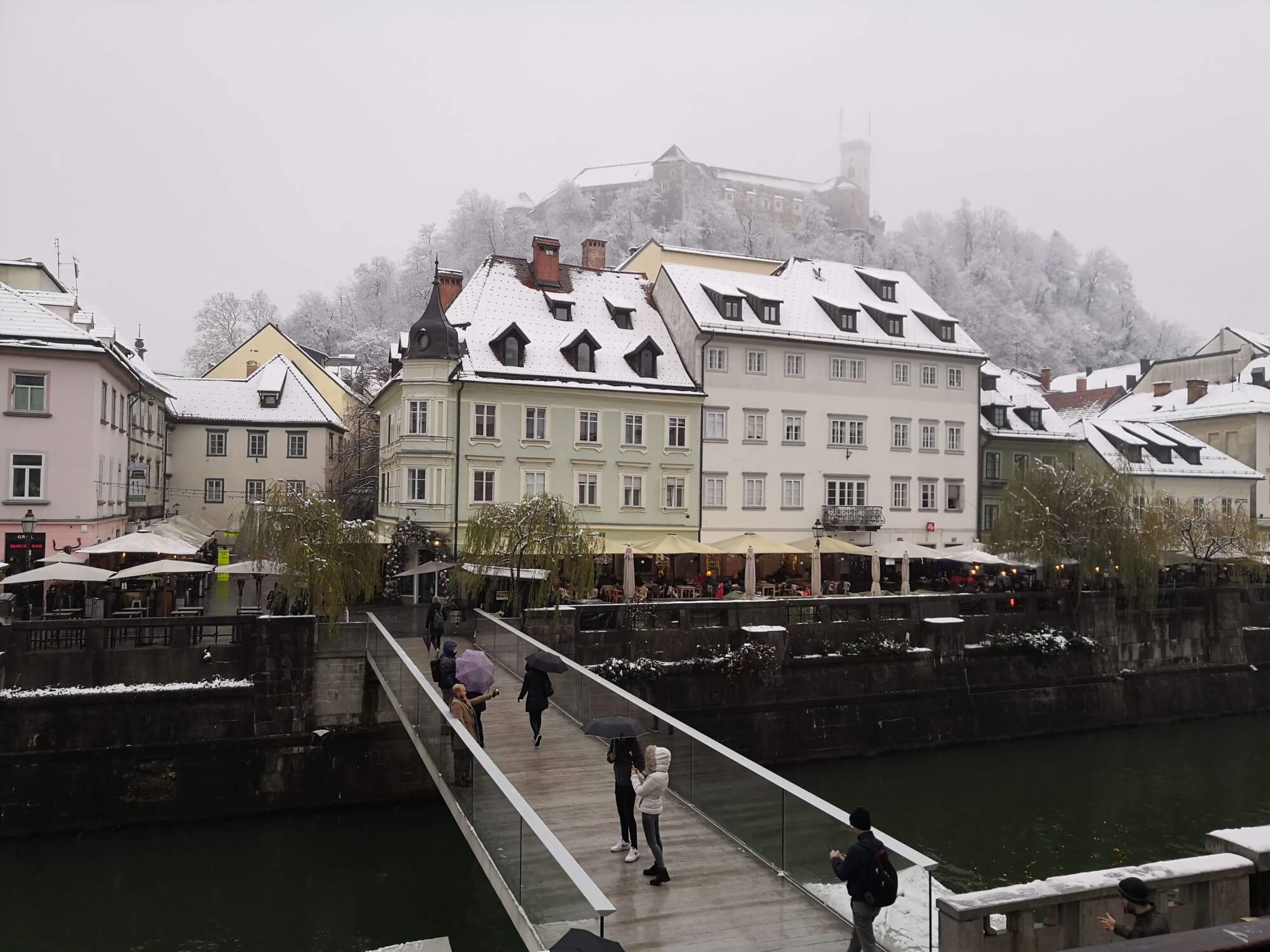All our stories on coronavirus are here, while those covering covid-19 and Croatia are here. We'll have an update at the end of the day, and if you want newsflashes then we'll post those on Facebook
We can’t have pictures of COVID-19 every day. So instead we’ll try and show the works of Slovenian artists. Today it’s Xenia Guzej. You can see more of her work here.
Contents
Healthcare system preparing Covid-19 exit strategy
Covid-19 hotline becomes barometer of public atmosphere
Fiscal Council finds government coronavirus measures justified
Do Foreigners Feel Safer in Slovenia?
STA, 7 April 2020 - After focussing all resources on Covid-19 patients and emergency cases since mid-March, the Slovenian healthcare system is preparing to gradually reopen to other patients while taking stringent precautionary measures. Hospitals have already received instructions from the Ministry of Health to start accepting other patients.
Because of the coronavirus epidemic, hospitals and other health institutions around the country have limited their services to treating emergency cases, cancer patients, child deliveries and paediatric cases.
But medical experts have been issuing increasingly dire warnings that such a regime must not last too long. Tit Albreht from the Public Health Institute has said a plan should be made before the summer on how to reactivate the healthcare system so as to prevent long-term detrimental effects on the population.
If patients with chronic diseases do not receive proper treatment this will become a big problem, he told the STA.
"You cannot freeze healthcare for 18 months or a year, because you run the risk of losing more patients to various other problems and chronic disease than to the epidemic," said Albreht, who is in charge of the Health Security Centre at the institute.
"A person who needs an operation, which may not be urgently needed right now, will have to be operated in a few months because by then it may become urgent."
In the first phase of the exit strategy, the country's biggest hospital, UKC Ljubljana, plans to start accepting patients with the level of urgency (which is indicated on referrals) 'fast', next to the 'urgent' and 'very fast' that it is accepting now.
UKC Ljubljana kept its hospital activity at 80% throughout the epidemic, according to Zlatko Fras, medical director of the internal clinic at UKC.
Doctors are dealing with some urgent cases alongside emergency cases via telephone or e-mail and the two channels will be used in the future as well.
"The backlog of a month or a month and a half will not be easy to make up but we'll do our best," Fras said. Specialist appointments and diagnostics will be increased gradually, he said.
According to the head of the gastroenterological unit at UKC, Borut Štabuc, endoscopic procedures will be launched again soon, and all patients with the level of urgency 'fast' and 'very fast' should be able to get treatment by the end of the month.
In order for all these patients to receive treatment, afternoon appointments will be introduced just like for cancer patients and patients with inflammatory bowel disease who are receiving biological drugs. The clinic also plans to work on Saturdays.
The head of the nephrology unit at UKC Ljubljana, Miha Arnol, said the epidemic had not changed much for dialyse patients, so 260-270 of them had been receiving regular treatment despite the epidemic. All patients are being tested for coronavirus and three cases of infections have been confirmed so far.
Patients with transplants are a very sensitive group as well. The condition of those in early stages after transplantation is being monitored using telemedicine, while transplant activity for non-urgent cases has been suspended. "We are conducting about 1,500 check-ups a day, which is about a third of all check-ups conducted before the epidemic," Arnol said.
UKC Ljubljana is now taking in the most demanding cases from all over the country, especially in cases requiring specialists in ophthalmology, neurology, dental medicine and otorhinolaryngology. The paediatric clinic is working with the most vulnerable children.
Annually about a million people are examined at UKC Ljubljana and some 100,000 people are hospitalised. UKC Ljubljana has about a third of all hospital capabilities in the country and during the epidemic, about 1,000 patients are at the hospital on a daily basis, about 50 of whom are Covid-19 patients.
Meanwhile, at UKC Maribor, 512 patients with conditions other than Covid-19 are hospitalised at the moment, and the hospital is treating all patients with the level of urgency 'urgent' and 'very fast'.
Several hundred such patients are treated daily, which is three times less than in the same period last year, Matjaž Vogrin, the hospital's medical director, told public broadcaster RTV Slovenija late last night. The number of hospitalised patients is 40% lower than in the same period last year.
Vogrin stressed in the Odmevi late news show that no member of the medical staff had gotten infected with coronavirus at the hospital so far, which showed that protective measures were working.
Currently, special medical councils are going through medical files to determine the order in which the hospital will start admitting other patients that need treatment.
Dušan Deisinger, medical director of the Izola hospital, told Odmevi they had no Covid-19 patients at the moment and were accepting only urgent cases and patients who need treatment very fast. The number of hospitalised patients is about a third of what the hospital had before the epidemic.
The hospital will now start accepting more patients in line with the ministry's recommendation.
Back to the contents
STA, 7 April 2020 - The UKC Ljubljana hospital launched a coronavirus crisis hotline four weeks ago, as Covid-19 contagion started taking hold in Slovenia. The call centre, manned by a crew of senior medical students guided by mentors, has since become much more than a hotline, growing into what is seen as a barometer of public atmosphere.
The centre is doing a very important job, government speaker Jelko Kacin said on Monday. It takes hundreds of calls a day and is in direct contact with the people, allowing an insight into which measures need to be clarified and what the people are worried about, as well as what they are happy with.
He said that the government looked into all the proposals forwarded to the call centre with care, one of them being the recent reopening of florists' shops and nurseries.
The hotline is available every day of the week at 080 1404 between 8am and 8pm, with callers having to wait for a response no longer than 30 seconds on average, said Mojca Matičič of the Ljubljana Infectious Diseases Clinic, which launched the hotline.
In total, the hotline was called more than 21,000 times, with the highest numbers, about 1,200 a day, reached after the government announced the closure of schools and presented the crisis stimulus package.
Matičič praised the team working in the centre, saying they were not only very knowledgeable but also showed a lot of empathy, commitment and dedication, and were very good in appeasing some callers, while warning others.
She said the basic purpose of the call centre to provide reliable information to the public has long since been surpassed, adding that the subject of the calls varied from one week to another, depending on the developments in the country.
In the first two weeks, people were calling in to ask about Covid-19 testing and the closure of borders and schools. Then they were calling about the use of protective gear, social distancing and movement restrictions, whereas most recently they are more worried about care provided by retirement homes and the functioning of the healthcare system.
Some callers also phone in to report people breaking quarantine and self-isolation and are steered to the relevant inspection services.
Back to the contents
STA, 7 April 2020 - The body overseeing Slovenia's adherence to the fiscal rule has endorsed the measures taken by the government to contain the coronavirus epidemic and mitigate its consequences, finding that extensive and multi-layered effective action by the government has been warranted.
The Fiscal Council, in a release issued on Tuesday, ascertained that the Slovenian government's measures were for the most part in agreement with recommendations by international organisations and by scope comparable to measures taken by other countries.
"Despite the temporary departure from fiscal sustainability over the mid-term being justified and taking into account the discussions upon the passage of the [EUR 3 billion stimulus] law, we are calling on all stakeholders that in taking further measures they follow even more than in the process so far the principles of the targeted nature of the measures addressing the consequences of the epidemic, their simplicity and time limitations," reads the release.
Considering the increased social and economic uncertainty and the substantial cost to public finances, the Fiscal Council recommends a more careful consideration as to when or in which phase of the battle against the epidemic certain measures would be the most effective and when potential stimulus measures would be needed to restart the economy.
The council says that it will crucially depend on the combination of the measures taken and their implementation whether the Slovenian economy will await the end of the epidemic in a shape that will allow it to exit the crisis as fast as possible.
A fast exit from the crisis and restoration of trust is one of the urgent conditions required to ensure social security and economic prosperity as well as to maintain fiscal sustainability in the long term.
International organisations recommend taking measures in a sequence that best addresses individual fields affected. "On those recommendations it is first necessary to ensure suitable means meet the health system's needs. In the next phase it is necessary to see to preserving jobs and allowing the economy to function as normally as possible."
Back in March, the Fiscal Council said that declaring an epidemic allowed temporary deviation from the mid-term structural budget balance. Given the projections of a substantial economic contraction, the measures taken will result in a high general government deficit and will push up government debt.
Back to the contents









